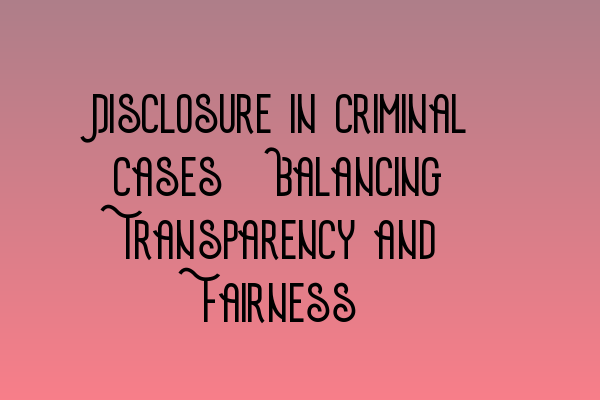Disclosure in Criminal Cases: Balancing Transparency and Fairness
Disclosure plays a crucial role in criminal cases, ensuring fairness and maintaining the integrity of the judicial process. It involves the exchange of information and evidence between the prosecution and the defense. This process allows both parties to prepare their cases effectively and promotes transparency in the court of law.
The Importance of Disclosure
In order to ensure a fair trial, the prosecution has a duty to disclose all relevant material to the defense. This includes evidence that supports the defense case, as well as evidence that could undermine the prosecution’s case. The defense, in turn, must also disclose any evidence that may be helpful to the prosecution.
Transparency is the cornerstone of a just legal system, as it allows both parties to present their arguments based on all available information. Without proper disclosure, the defense may be at a significant disadvantage, unable to challenge the prosecution’s case effectively.
However, striking a balance between transparency and fairness can sometimes be challenging. The sheer volume of information involved in criminal cases, coupled with the need to protect sensitive data, can complicate the disclosure process.
Challenges in Disclosure
One of the primary challenges in disclosure is the vast amount of digital data involved in modern criminal investigations. With the proliferation of electronic devices and online communication platforms, investigators often have to sift through terabytes of data to identify relevant evidence. This can be time-consuming and resource-intensive.
Furthermore, there may be concerns regarding the disclosure of sensitive information. In certain cases, the Crown Prosecution Service (CPS) may withhold certain details to safeguard national security or protect the identity of informants. Striking the right balance between transparency and the protection of sensitive information is crucial in such situations.
Ensuring Effective Disclosure
Efficient case management is key to ensuring effective disclosure. The prosecution and defense must work collaboratively to identify and exchange relevant material in a timely manner. This includes properly organizing and cataloging digital evidence to streamline the disclosure process.
Technology can also play a crucial role in enhancing the disclosure process. Advanced software tools can assist investigators in analyzing and categorizing digital data, simplifying the identification of relevant evidence.
Moreover, proper training for legal professionals in understanding the importance of disclosure and its implications is essential. Familiarity with the legal framework and best practices for disclosure can help ensure that all parties are fully aware of their obligations and can fulfill them effectively.
Conclusion
Disclosure in criminal cases is vital to the fair administration of justice. Balancing transparency and fairness can be challenging, but with proper case management, technological advancements, and training, the disclosure process can be streamlined and the interests of both parties can be protected.
At SQE Criminal Law & Practice Law UK, we understand the importance of disclosure in criminal cases. Our expert solicitors are well-versed in the complexities of the criminal justice system and are committed to upholding transparency and fairness in every case. We offer comprehensive SQE 2 Preparation Courses and SQE 1 Preparation Courses to equip aspiring lawyers with the necessary knowledge and skills to excel in their careers.
For more information about the SRA SQE exam dates and our range of preparation resources, including SQE 1 Practice Mocks FLK1 FLK2 and SQE 1 Practice Exam Questions, please visit our website.
